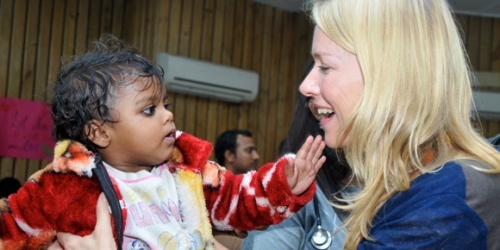

Ironic that on day that some Congressmen apparently seeking to curtail contraceptive access for American women, the UN Joint Program HIV/AIDS (UNAIDS) has emphasized such as fundamental human and health right.
Contraception as HIV/AIDS Prevention:
Both hormonal contraceptives and condoms to prevent unwanted pregnancies and HIV infection, should be made available was the message after renewed consultations with health experts on the issue. According to UNAIDS Executive Director Michel Sidibe: “Women need safe contraceptive and HIV prevention options that they can own and manage. New investments into research for female controlled HIV prevention options and safe contraceptive methods are essential.” Not giving women and girls access to these methods increases their vulnerability to HIV infection. According to UNAIDS, about half of the 34 million people living with HIV are women. In sub-Saharan Africa, the region most affected by the epidemic, nearly 60 per cent of all new HIV infections occur in women.
Contraception in Family Planning:
The level of unmet family planning need among the 1.18 billion women between the ages of 15 and 49 worldwide is estimated to be 11 per cent, while in sub-Saharan Africa it is more than twice as high, at 25 per cent. UNAIDS recommends that people who are sexually active – particularly women and girls – have full access to information and counselling to make informed choices about their sexual and reproductive health needs. “Women and girls must have access to the widest range of contraceptive and HIV prevention options. Such services must be provided in an integrated manner by health workers.” BELOW is Full Statement from UNAIDS & Links:
UNAIDS PHOTO – Naomi Watts – UNAIDS Goodwill Ambassador
PHOTO – 2 – Annie Lennox (UNAIDS Goodwill Ambassador) with Michel Sidibe (ED of UNAIDS)
Link to UNAIDS -
www.unaids.org/en/
By Ambassador Muhamed Sacirbey – Follow @MuhamedSacirbey
Facebook = Become a Fan at “Diplomatically Incorrect”
Twitter – Follow us at DiplomaticallyX
UNAIDS Statement:
A stakeholder consultation convened by the World Health Organization (WHO) in Geneva has reviewed recent epidemiological studies related to HIV transmission and acquisition by women using hormonal contraceptives. After careful review of all available evidence, the stakeholders found that the data were not sufficiently conclusive to change current guidance.
In light of this review, WHO today announced that its current recommendation¬¬—no restrictions on the use of hormonal contraceptives to avoid unintended pregnancies—remains unchanged. They also recommend that women using progestogen-only injectable contraceptives also use condoms or other measures to prevent HIV infection. This information must be communicated to sexually active women and girls by health workers pro-actively.
About half of the 34 million people living with HIV are women. In sub-Saharan Africa, the region most affected by the epidemic, nearly 60% of all new HIV infections occur in women.
The level of unmet family planning need among the 1.18 billion women aged 15–49 worldwide is estimated to be 11%. Among the 128 million women (married or in a union) aged 15–49 in sub-Saharan Africa, the estimated unmet need for family planning is more than twice as high, at 25%. This highlights the urgency of finding innovative solutions that address the dual needs of women in preventing HIV and stopping unintended pregnancies.
While a range of contraceptives protect against unintended pregnancies, only condoms, male and female, provide dual protection by stopping HIV transmission and preventing unintended pregnancies.
The Joint United Nations Programme on HIV/AIDS (UNAIDS) recommends that people who are sexually active—particularly women and girls—have full access to information and counselling to make evidence informed choices about their sexual and reproductive health needs. Women and girls must also have access to the widest range of contraceptive and HIV prevention options. Such services must be provided in an integrated manner by health workers.
The lack of female controlled methods of HIV prevention and low levels of condom use place women and girls at increased vulnerability to HIV infection. “Women need safe contraceptive and HIV prevention options that they can own and manage,” said Michel Sidibé, Executive Director of UNAIDS. “New investments into research for female controlled HIV prevention options and safe contraceptive methods are essential.”



